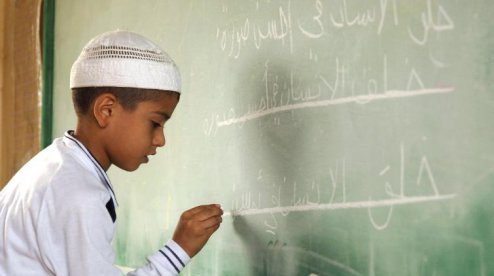Arabic dialects are the common, informal variations of Arabic spoken in different places. Unlike formal Arabic, which is utilized in news and official papers, these dialects offer a personal touch to discussions, TV shows, and community activities. Some of the most popular dialects include Egyptian Arabic, Levantine Arabic, Gulf Arabic, and Maghrebi Arabic.
Each has a distinct syntax, vocabulary, and pronunciation that has been influenced by the culture and history of its location. Arabic dialects, unlike Modern Standard Arabic (MSA), are neither uniform or standardized, hence they can sound significantly different, even within the same nation.
Table of Contents
1. Egyptian Arabic
Egyptian Arabic is the most commonly understood dialect in the Arab world, owing to Egypt’s strong position in Arabic media, particularly television and cinema. It is spoken by approximately 100 million people in Egypt and is often regarded as the Arab world’s “lingua franca” for casual conversation.
- Key Pronunciation: The letter “ج” is pronounced as a soft “g,” hence the word “جمل” (camel) is spoken as “Gamal” in Egyptian Arabic, rather than “Jamal.”
- Influences: Egyptian Arabic includes borrowed terms from Coptic, Turkish, French, and English, reflecting Egypt’s long history of cultural exchange.
2. Levantine Arabic
Levantine Arabic is spoken in nations such as Lebanon, Syria, Jordan, and Palestine. This dialect is commonly referred to as Shami Arabic. It has also been affected by French (particularly in Lebanon) and Turkish because of Ottoman dominance in the region.
- Key Pronunciation: In some locations, the letter “ق” (qāf) is pronounced as a glottal stop (similar to the word “uh-oh”). For instance, “قلب” (heart) is pronounced “2alb.”
3. Gulf Arabic
Gulf Arabic is widely spoken in the Arabian Peninsula, including Saudi Arabia, the United Arab Emirates, Kuwait, Qatar, Bahrain, and Oman. This dialect varies throughout the Gulf, yet speakers from different Gulf countries generally understand one another.
- Key Pronunciation: Gulf Arabic typically retains the traditional pronunciation of “ق” (qāf), unlike other dialects that shift. For instance, “قلب” (heart) sounds like “qalb.”
4. Maghrebi Arabic
Maghrebi Arabic is the primary language in North African countries including Morocco, Algeria, Tunisia, and Libya. It is also known as Darija, and it differs significantly from Middle Eastern dialects, making it difficult for people of other dialects to understand without previous exposure.
- Key Pronunciation: Many sounds in Darija have accents with strong influences from the Berber, French, and Spanish languages. For instance, “لا” (no) becomes “la” in MSA but may sound like “leh” in Moroccan Arabic.
5. Sudanese Arabic
Sudanese Arabic is spoken across Sudan and parts of South Sudan. Because of its location, it bears similarities with Egyptian Arabic, although it also has distinct characteristics.
- Key Pronunciation: Sudanese Arabic, unlike Egyptian Arabic, preserves more Classical Arabic sounds. For example, “ج” is pronounced “j” rather than the Egyptian “g.”
Riwaq Al Quran is a comprehensive online platform that offers personalized Quran, Arabic and Islamic Studies Online classes for individuals of all ages and backgrounds.
We offer several courses such as:
- Online courses for kids.
- Online Quran classes for kids and adults.
- Online Arabic courses
- Online Ijazah courses
- Online Islamic Studies courses.
Conclusion:
Arabic dialects are informal, spoken variations of Arabic used in everyday life across different regions. Unlike formal Modern Standard Arabic (MSA), which is used in media and official documents, dialects like Egyptian, Levantine, Gulf, Maghrebi, and Sudanese Arabic reflect local culture, history, and pronunciation differences. Each dialect has unique vocabulary and sounds, making them distinct and sometimes hard to understand even within the same country.
For example, Egyptian Arabic is widely understood due to Egypt’s media influence, while Maghrebi Arabic differs greatly from Middle Eastern dialects because of Berber and European influences. Platforms like Riwaq Al Quran provide online courses to learn Quran, Arabic, and Islamic studies, helping learners engage with these dialects and the broader Arabic language effectively.


































